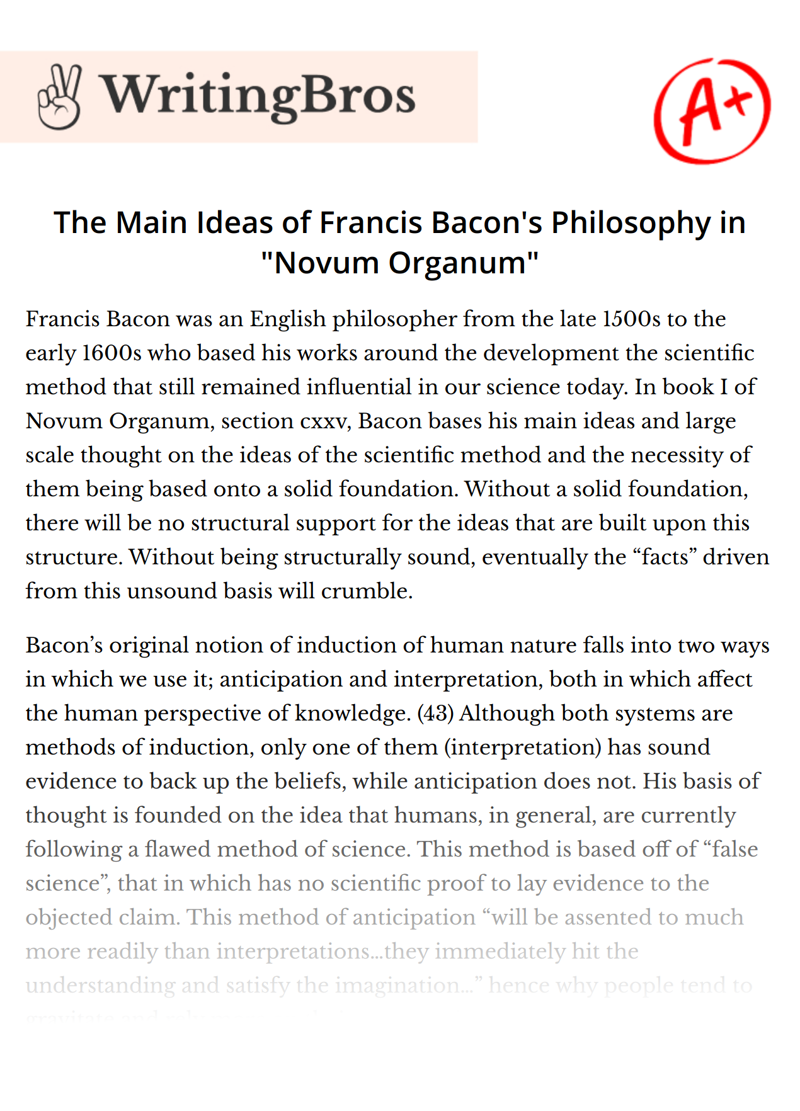The Main Ideas of Francis Bacon's Philosophy in "Novum Organum"

Francis Bacon was an English philosopher from the late 1500s to the early 1600s who based his works around the development the scientific method that still remained influential in our science today. In book I of Novum Organum, section cxxv, Bacon bases his main ideas and large scale thought on the ideas of the scientific method and the necessity of them being based onto a solid foundation. Without a solid foundation, there will be no structural support for the ideas that are built upon this structure. Without being structurally sound, eventually the “facts” driven from this unsound basis will crumble.
Bacon’s original notion of induction of human nature falls into two ways in which we use it; anticipation and interpretation, both in which affect the human perspective of knowledge. (43) Although both systems are methods of induction, only one of them (interpretation) has sound evidence to back up the beliefs, while anticipation does not. His basis of thought is founded on the idea that humans, in general, are currently following a flawed method of science. This method is based off of “false science”, that in which has no scientific proof to lay evidence to the objected claim. This method of anticipation “will be assented to much more readily than interpretations…they immediately hit the understanding and satisfy the imagination…” hence why people tend to gravitate and rely more on their preconceived perceptions of anticipation rather than do the work for interpretation.(43)
Francis Bacon’s ideas are highly based upon the idea that we, in his current society, like to base our ideas off of pre-existing models and discourage change, but overall, we need a new scientific method. Not only do we like to stick to our old ways but we often like to repeat ourselves in the motions and concepts we have previously based our lives on. Bacon begins section CXXV by referencing back to the ancients before our time. He says “…we are only doing that which has already been done, and that ancients followed the same course as ourselves”. (54) We follow the history of those before us and often like to base our ideas off of an already built basis. As the times go on, people continue to build off of this base structure rather than demolishing it and starting from scratch because to doubt and question what is already build and “sound” is much more work than simply adding to what is already there.
Bacon goes on to say, “it was of such a nature, that they immediately flew from a few instances and particulars (after adding some common notions, and a few generally received opinions most in vogue) to the most general conclusions, and tried them by the rest of the immovable and settled truth of the first…”. (54) In this quote, he references “after adding some common notions, and a few generally received opinions”, which is showing that their basis of truth is really not based on knowledgeable truth with factual evidence to support it, but rather has a basis of opinion and common notions that are accepted by the people with little to no information to support them. This lack of evidence leads to a not-so-sound basis for the structure they are building from and believing in and in turn, leads the people to believe in information with no support.
Bacon continues to elaborate on the ancients’ way of building their knowledge. He brings to light that, “If some new particulars and instances were brought forward, which contradicted their dogmas, they either with great subtility reduced them to one system, by distinctions or explanations of their own rules, or got rid of them clumsily as exceptions” in order to “accommodate the causes of such as were not contradictory to their own principles”. (54) Bacon here is saying that if what was brought to light by the ancients (or us) contradicted their own beliefs, they would essentially sweep that information under the rug so that it would not disprove that in which they believe. They would do one of two things, either reduced all of the information down to the basics of that idea or they would get rid of the idea as a whole but would blame this on exceptions to their own standing rules and ideas.
Bacon knew that the way in which they were building the bases for their information was wrong. “Their natural history and their experience were both far from being what they ought to have been and their flying off generalities ruined everything”. (54) He prods at this idea since there is no truth or solid methods to back their “explanations” off of. Bacon’s main idea of this section is to prove to the reader that the way of “proof”, that in which is influenced by ones’ own beliefs or ideas, needs to be reconstructed and based on a new form of scientific method. This is due to their way of “knowledge” is not based on certain, undoubtable truth and fact. This is why Bacon focuses so much on the idea that without a solid foundation, there will be no structural support for the ideas that are built upon it and therefore without structurally stability, eventually, this unsound basis will crumble as will anything based on it.
Cite this Essay
To export a reference to this article please select a referencing style below

